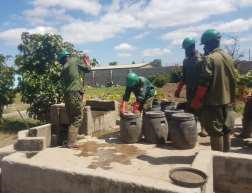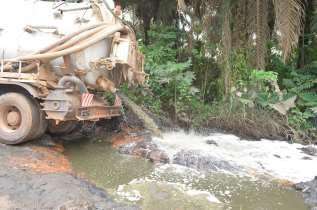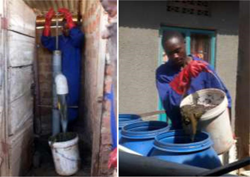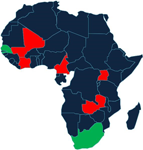 |
| Vacuum truck emptying at a discharge site |
Component 1: Technical Guidance
Based on the FSM toolbox developed by BMGF, an African adapted toolkit will be created. The adapted toolkit for sanitation services will be disseminated through trainings and practical use during exchange visits, and published online. Two performance assessment questionnaires will be developed and used as a tool for a baseline and final evaluation of involved utilities/municipalities and small service providers. By comparing the baseline and final evaluations, AfWA will gather the success factors that led to these achievements and produce materials for dissemination online and in hard copy to reach even operators not involved in the project.
Component 2: Capacity Building
With funding from the USAID FABRI program, a sanitation status assessment including FSM and non- sewer sanitation systems in multiple African countries was carried out to identify five beneficiary cities or mentees, and mentor operators. These partnerships will have the objective to (i)  Manual pit emptiers in Lusaka, Zambia develop an urban strategic plan, (ii) adopt an appropriate operations framework for improving urban sanitation with a non- sewer and FSM component, and (iii) develop a Performance Improvement Plan (PIP) and fundable projects
Manual pit emptiers in Lusaka, Zambia develop an urban strategic plan, (ii) adopt an appropriate operations framework for improving urban sanitation with a non- sewer and FSM component, and (iii) develop a Performance Improvement Plan (PIP) and fundable projects July 201 for implementation. Mentors, with the support of two external consultants, will audit Mentee performance during an exchange visit and identify improvement areas. A benchmarking visit will be carried out so Mentee staff can see the improvements put in place by Mentor utilities/municipalities. Skill gaps will be addressed through hands-on training specific to each city’s needs by Mentors and Consultants during exchange visits. These trainings will be conducted by the Consultants assisted, if necessary, by international experts and will involve all stakeholder categories of the Mentee city.
July 201 for implementation. Mentors, with the support of two external consultants, will audit Mentee performance during an exchange visit and identify improvement areas. A benchmarking visit will be carried out so Mentee staff can see the improvements put in place by Mentor utilities/municipalities. Skill gaps will be addressed through hands-on training specific to each city’s needs by Mentors and Consultants during exchange visits. These trainings will be conducted by the Consultants assisted, if necessary, by international experts and will involve all stakeholder categories of the Mentee city.
Component 3: Enabling Environment
A strategic planning workshop will be conducted after the audit visit and once the PIP is available with all of the important national and local level stakeholders. The main output will be the Strategic Urban Sanitation Plan (SUSAP) of the city, which will include the (i) prioritized problems, (ii) potential solutions and options, (iii) key actors and their roles, (iv) financing mechanisms, (v) monitoring and evaluation framework, and (vi) implementation timeframe. The SUSAP is considered as an operational framework for implementation of sustainable sanitation by the utility/municipality, therefore its adoption will remain only at a technical level and will not need any specific legislation or act from a political body. Through this component, the establishment of at least 10 licenses for small sanitation  operators (minimum of two per city) and creation of at least three national associations of small sanitation
operators (minimum of two per city) and creation of at least three national associations of small sanitation operators affiliated with become AfWA member, an essential milestone for any African water or sanitation company.
operators affiliated with become AfWA member, an essential milestone for any African water or sanitation company.
Component 4: Project Management and Governance
AfWA’s overall capacity for project and program management will be improved through implementing this project. A highly-qualified project coordinator will be recruited and along with other associated AfWA staff (executive director, administration, finance director and monitoring and evaluation (M&E) manager) will be trained by the BMGF project task manager on the donor’s grant management requirements and reporting procedures.
M&E workshops (every 6 months) and AfWA Program committee sessions (at least two per year) will be held to ensure that normal progress is made, validate the quality of outputs and results, monitor the expense rate of the budget and validate their regularity. A final audit report on the proje ct’s funds and management procedures will be produced and made accessible to the public.

 English
English  Français
Français 